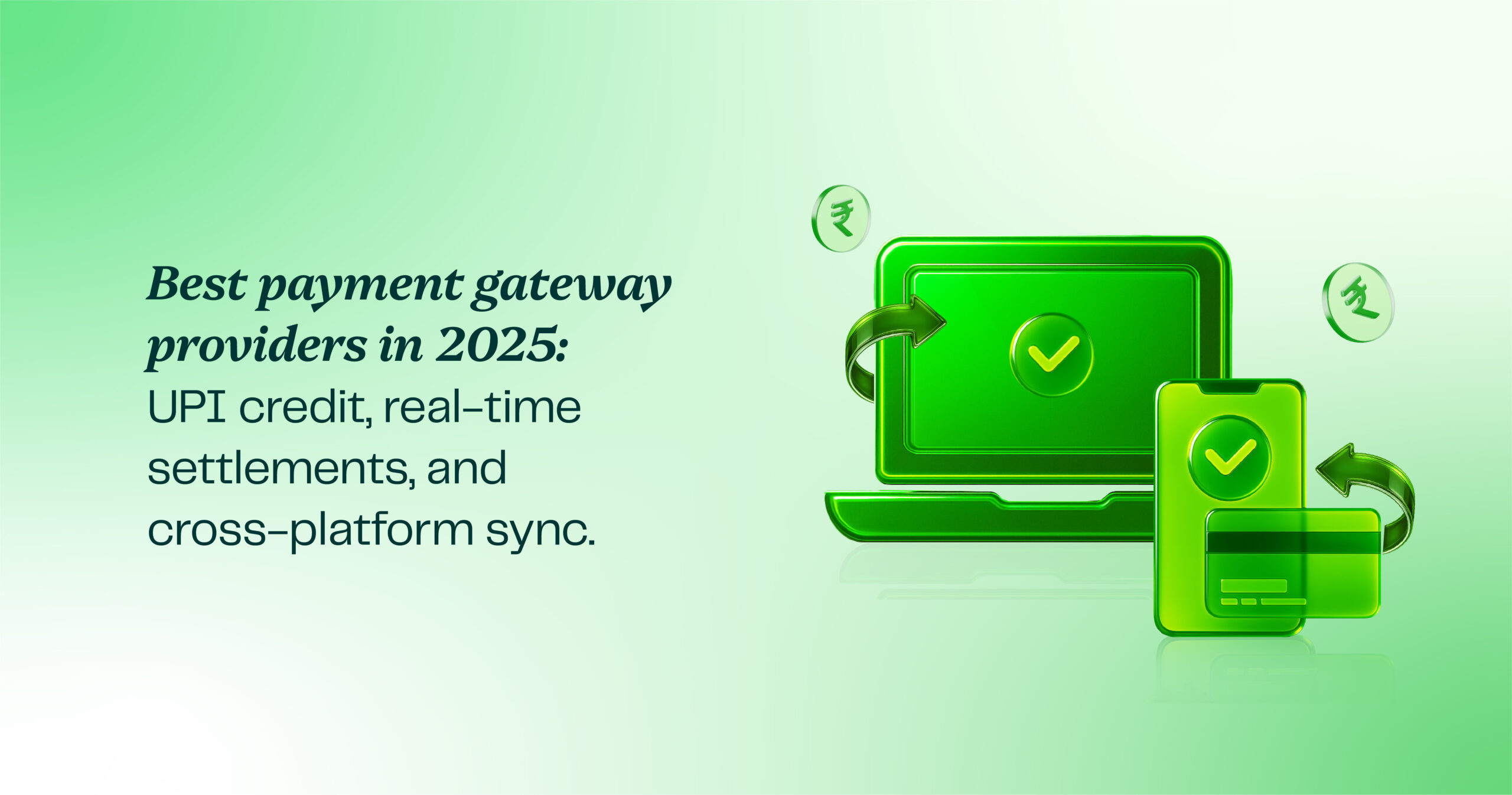A Gen Z shopper checks out your online store, moves a few items to the cart, and pays via UPI credit. Your dashboard lights up with a real-time update of the transaction. Funds settle into your account instantly.
Welcome to the new era of payment gateway providers!
As payment technology continues to evolve along with customer expectations, choosing the right provider has become a huge responsibility.
In this article, we’ll reveal the features that the best payment gateway providers support, the types of providers available in the market, and the steps to choose the right one for your business.
What makes a payment gateway provider “best” in 2025?
We don’t throw around the term ‘best payment gateway providers‘ lightly. The top gateways out there do so much more than just process payments. They help you stay compliant and grow your business.
Here’s what the top gateway providers should offer you:
1. Real-time analytics
You should be able to see, in real-time, how strong your financial health is. The best providers give you granular insights into your business’s conversion rates, customer behavior, and sales trends. You need these metrics to make informed decisions needed to grow your business.
2. Omnichannel readiness
This one is non-negotiable. Customers aren’t doing business with you from a single channel. They are using apps, websites, and POS (Point-of-sale) systems at your physical store.
The best payment gateway providers must offer cross-platform capabilities with unified dashboards. This will help you see it all in action on a centralized platform.
3. Risk management
A reliable gateway can detect and mitigate fraud easily.
Today, most top providers are using AI to:
- block suspicious transactions
- detect anomalies
- and maintain high approval rates.
They also use tokenization to hide sensitive information, such as credit card numbers, with a randomly generated, unique token. Not to mention, they maintain compliance with security frameworks like data localization and PCI DSS (Payment Card Industry Data Security Standard).
4. Support for diverse payment methods
This is essential, especially if you’re serving mobile-first markets. Your chosen payment gateway provider must support diverse transaction methods, such as BNPL (Buy Now, Pay Later) and UPI Credit.
For example, UPI Credit allows your customers to make credit card payments through UPI without ever needing to carry a physical card!
5. API/SDK integrations
Your gateway provider should also offer developer-friendly API/SDK integrations. It’s a necessary feature that helps you scale rapidly by catering to your unique business needs.
6. Real-time settlements
If your business handles high-volume transactions, this is super important. Real-time settlements help you get payments faster, often instantly (T+0) or on the same day. With top payment gateway providers, you don’t have to wait days to access your money.
7. Smart routing and retry
Payment failures are sometimes unavoidable. However, the best payment gateway providers reroute failed transactions to increase the chance of success. And it requires zero effort from your end!
Types of payment gateway providers and their strengths
Not all payment gateway providers are created equal. Depending on your business needs, you need to choose the best provider.
Listed below are the types of gateway providers that you must know:
- Bank-Led Gateways (e.g., HDFC, Axis): These are the most reliable payment gateways you can choose. They enjoy regulatory trust but often lack innovation.
- Fintech Players (e.g., Razorpay, Cashfree): These payment gateways are known for their agility and developer-friendliness. They also offer rich dashboards and smart APIs. Digital-first businesses and startups are usually the ones that choose fintech gateways.
- Commerce-Native Gateways (e.g., Shopify Payments): Custom-made for eCommerce platforms, these gateways offer seamless integration, unified dashboards, and simplified reconciliation.
- Enterprise-Focused Gateways: Built for scale, compliance, and integrations, enterprise gateways are ideal for high-volume transactions. They offer custom integrations, multi-country compliance, and fraud protection.
Your ideal payment gateway depends on your transaction volume, industry, and business size. For instance, a D2C brand may benefit from the speed of a fintech gateway, whereas a large retailer may need an enterprise-focused gateway.
Pine Labs is one such enterprise-ready gateway with omnichannel support, superior risk management, and smart routing features.
Choosing the right payment gateway provider: A decision framework
In this section, we’ll give you a step-by-step framework for choosing the right payment gateway provider to make things easier for you:
Step 1: Assess your transaction volume and average ticket size
If your business deals in high-volume transactions, you might want to go for a provider with a low MDR (Merchant Discount Rate). On the other hand, if you are a premium brand with fewer but high-ticket transactions, you want to zone in on high approval rates and fraud protection.
Step 2: Make a list of features
What kind of features should your ideal payment gateway provider support? You should choose a gateway that can meet your current and future needs. The best way to go about it is to make a list of features, such as:
- EMI options
- Recurring billing for subscriptions
- Support for digital wallets
- UPI, BNPL, multi-currency payments
Step 3: Evaluate settlement timelines and integration support
If cash flow is your utmost priority, choose a provider that offers same-day or real-time settlements. Also, look for ease of API/SDK integration, developer support, and quality of onboarding documentation.
Step 4: Compare pricing transparency and SLA terms
Cost is an important factor when choosing among the best payment gateway providers. Make sure there are no hidden costs. The provider should be transparent about support costs and chargeback fees, if any. Make sure to review SLAs (Service Level Agreements) for:
- Dispute handling
- Support response times
- Uptime guarantees
Step 5: Choose a partner with reliable support and upgrade roadmap
If innovation is critical to your business and customers, choose a payment gateway that keeps adding new payment methods (such as UPI credit), security features, and analytics. This way, your business transactions will be future-proof without you having to worry.
Needless to say, a strong and responsive customer support team is critical to resolving any issues that you face at any time.
The best gateway is the one that grows with you!
The best payment gateway providers in 2025 aren’t just about processing payments. They’re about enabling growth. With features like UPI Credit, real-time settlements, and cross-platform sync, businesses can drive conversions, reduce ops overhead, and prepare for scale.
With Pine Labs, your search for the perfect payment gateway comes to an end. Pine Labs is known for its high success rate, custom integrations, analytics, omnichannel support, and top-notch risk management in the industry.
Contact us today to enjoy the Pine Labs Advantage!

